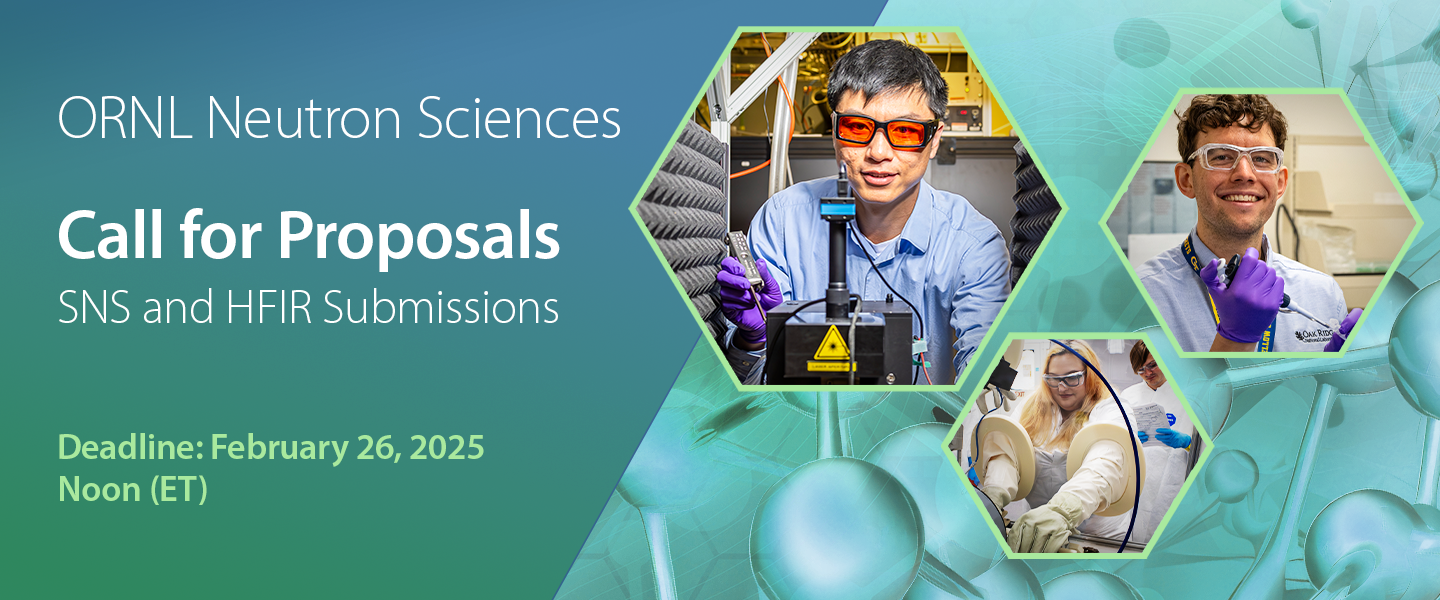Proposal Calls
2025-B General User Proposal Call
The 2025-B proposal call closed on February 26, 2025. Proposals awarded beam time will be scheduled to run at HFIR and SNS from July to December 2025. Award notifications were sent on April 25, 2025.
In the 2025-B proposal call, SNS received 513 beamtime requests; 221 were approved and 115 placed in Alternate status. HFIR received 222 beamtime requests; 99 were approved and 67 placed in Alternate status.
2026-A General User Proposal Call
The submission deadline for the 2026-A General User Proposal Call is August 20, 2025 at Noon (12pm) Eastern. Proposals awarded beam time will be scheduled to run at HFIR and SNS from January to June 2026.
Researchers should apply directly via the Integrated Proposal Tracking System (IPTS). For more information, contact the User Office.
Users are highly encouraged to discuss proposed research with an instrument scientist for feedback before submitting. New PIs may be interested in applying for beamtime through the New User Beamtime (NUBe) program.
Important Dates
Submission deadline: August 20, 2025 at Noon (12pm) Eastern
Award period: January to June 2026
- SNS: projected to run March to June, 2026
- HFIR: projected to run January to March, and June, 2026 (HFIR fuel cycles 516-518)
Award notification by October 17, 2025
Instrument updates:
VENUS/BL-10 - The ORNL Neutron Sciences Directorate is thrilled to announce the SNS VENUS time-of-flight (TOF) imaging beamline will be available through the user program starting 2025-B. Epithermal/thermal TOF and white beam imaging capabilities across a field-of-view of 28 x 28 mm2. We recommend you contact VENUS imaging scientist Hassina Bilheux (bilheuxhn@ornl.gov) to discuss feasibility of your project(s) and to learn more about VENUS. Additional information about VENUS is available on the instrument webpage.
New User Beamtime (NUBe) Program
In this call we are piloting the NUBe program aimed at growing the neutron scattering user community and increasing the scientific and institutional diversity of our user base. Time will be allocated for NUBe proposals on each instrument participating in this call. For eligibility in this program, the Principal Investigator must hold a permanent position at their institution (i.e., any rank of faculty member or staff). Undergraduates, graduate students, and post-docs are not eligible, but may participate as collaborators on the proposal. See the the New User Beamtime (NUBe) program webpage for more information.
New Experiment Lead Role and PI requirements
Effective February 2025, the Principal Investigator (PI) listed on a proposal must be the team member who has overall responsibility for the research group and someone who holds a permanent position at their institution, such as Assistant Professor, Professor, Research Scientist or Professional Staff. The Principal Investigator (PI) role can only be assigned to an individual with an active IPTS account. See Step 5 on the How to Submit a Proposal webpage for instructions to create an account.
A new Experiment Lead role is now available to indicate a co-primary contact on a proposal. A team member who is Undergraduate, Graduate or Post-doctoral Research Associate and who is serving as primary contact for experiment planning and/or conduct should be designated the Experiment Lead. The Experiment Lead has the same proposal access as the PI. The Experiment Lead can edit a proposal, confirm a proposal awarded beam time, add samples, and add team members. The Experiment Lead is copied on all proposal-related messages sent to the PI.
Every proposal must have a PI. Experiment Lead is an optional role but, if used, there can be no more than one Experiment Lead designated.
Center for Nanophase Materials Science (CNMS) Resources Available
The Center for Nanophase Materials Science (CNMS) provides access to staff expertise and state-of-the-art equipment for a broad range of nanoscience research, including nanomaterials synthesis and deuteration, nanofabrication, imaging/microscopy/characterization, and theory/modeling/simulation. Users may request characterization time on their neutron proposal in IPTS or may submit a proposal directly to CNMS. NEW! - Eight Deuterated Monomers are available to be requested through a CNMS Rapid Access proposal in order to support neutron scattering studies at SNS and HFIR.



